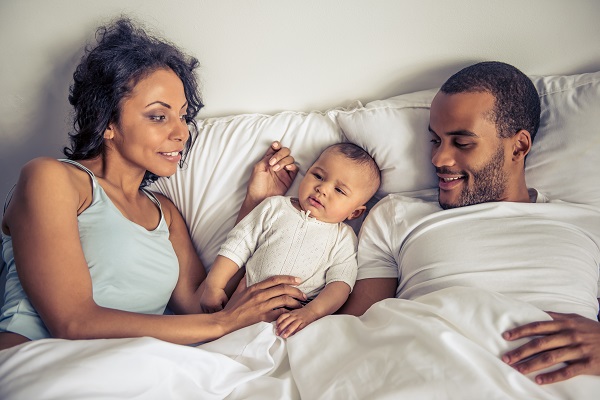If the answer’s no, read on for help with all your child’s sleep issues.
“I love to sleep,” said Dr. Katie McKie.
She’s serious—it’s why she went into sleep medicine—and now as mom to 3-year-old Charlie, it’s also why sleep issues in children are even more personal for her. Charlie is a good sleeper now, but in those early years of constant awakenings, she still remembers what got her through: “My mother told me, ‘He won’t be doing this when he’s in college.”
Most parents will give a wry laugh at this. Sleep is among the top issues for parents, both sleep for themselves and for their children. While most babies will settle into a sleep routine, sleep issues can rear their crying, wailing, up-at-midnight heads anytime from infancy to age 18, according to McKie.
While pediatricians will typically screen for sleep issues during well-child visits using the BEARS tool, parents should also bring up any signs that their child is having poor sleep, everything from the inability to sleep (or stay asleep) and snoring to bedwetting and hyperactivity during daytime hours.
That’s typically when pediatricians refer children to McKie. Together with the area’s only dedicated sleep lab for children, she offers sleep counseling and treats disorders ranging from sleep apnea and snoring to sleep walking and night terrors.
But it’s the more complicated sleep problems that could require further treatment—which is why McKie and pediatric ENT surgeon Dr. Drew Prosser recently launched a new multidisciplinary clinic just for these families.
When Sleep Doesn’t Happen
Sleep apnea is one of the more common reasons why your child can’t sleep, and the solution is pretty simple: surgery to remove the tonsils and adenoids. It’s a surgery that Dr. Prosser performs regularly and with great success for sleep problems.
But even after surgery, some children still have trouble sleeping. That’s where their new complex sleep clinic can help.
In most parts of the country, kids might spend months seeing multiple specialists before receiving a treatment plan. But a growing trend at larger children’s hospitals is a multidisciplinary sleep clinic that combines experts in pulmonary, ENT, nutrition, plastic surgery and respiratory therapy who together see patients at one visit, with other specialists brought in as needed. It’s strategy that rapidly reduces time to treatment, a key factor in improving learning in sleep-deprived kids.
“The evidence that poor sleep quality affects a child’s ability to learn is well-recognized,” said Prosser. “But the data also shows that if you treat poor sleep, the ability to learn improves, as do neurocognitive outcomes, inattentiveness, behavior issues and poor school performance.”
At the Children’s Hospital of Georgia, the process begins with a referral to either McKie or Prosser for a sleep issue. Once the child has been evaluated and/or treated (but continues to experience sleep issues), either physician can determine to enroll him or her into the complex sleep clinic. Children will often also need a sleep study, which happens in the dedicated pediatric sleep lab on the fourth floor at CHOG.
Although families can be surprised that there is a whole specialty dedicated to sleep, particularly sleep in children, they are pleasantly surprised to know that it’s available, said McKie, especially during those early years. “As parents, we all go through the process of helping our child learn to sleep,” said McKie. “But you don’t have to go through it alone. Our sleep services—including just general counseling on sleep routines and sleep hygiene—are here as a local resource, and that’s a huge benefit to families in the CSRA.”
From newborns to adolescents, kids come first at Children’s Hospital of Georgia. Find out more at augustahealth.org/chog or call 706-721-5437.




